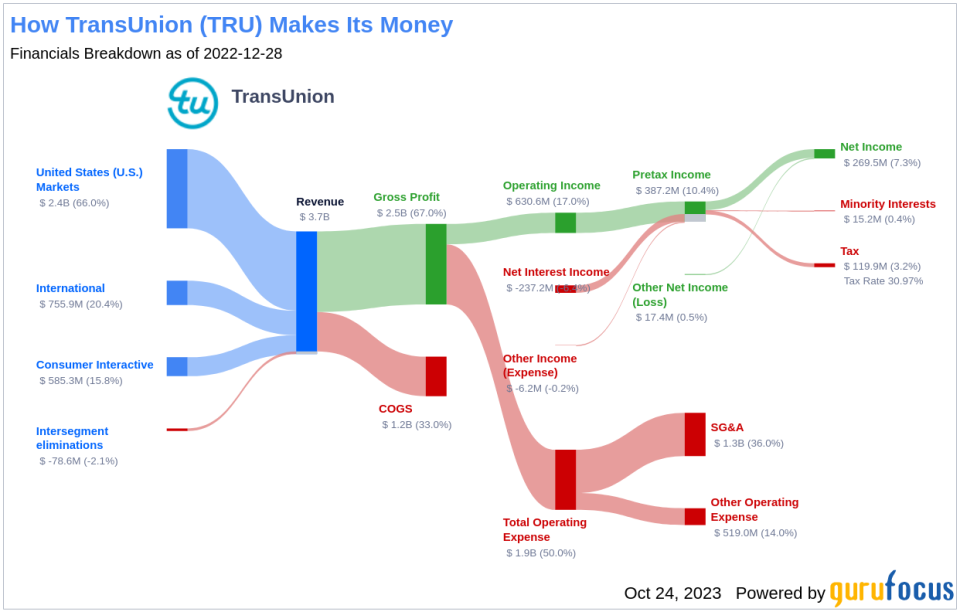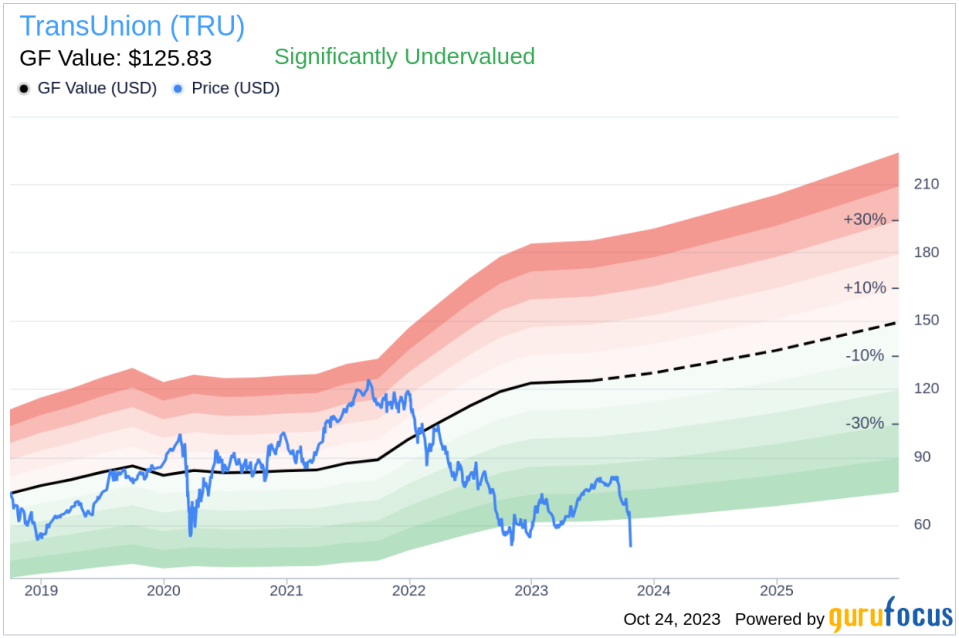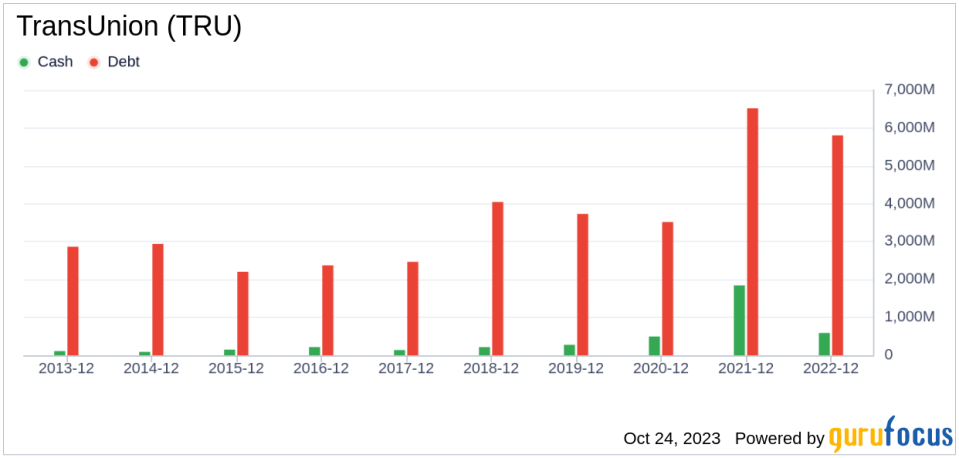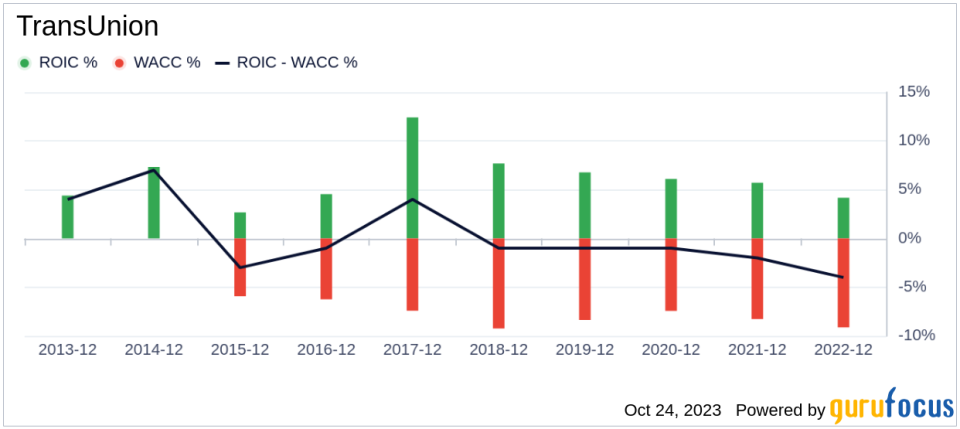TransUnion (TRU): An Undervalued Gem or a Risky Bet? A Comprehensive Analysis of its Market Value
TransUnion (NYSE:TRU) experienced a daily loss of 20.56% and a 3-month loss of 19.14%, with an Earnings Per Share (EPS) of 1.2. This raises the question: is TransUnion's stock significantly undervalued? This article aims to answer this question by providing a comprehensive valuation analysis of TransUnion. Continue reading to uncover the intrinsic value of this stock.
Company Overview
TransUnion is a leading credit bureau in the United States, offering consumer information that forms the basis for granting credit. The company also provides fraud detection, marketing, and analytical services. Operating in over 30 countries, TransUnion generates about a quarter of its revenue from international markets. The current stock price stands at $51.52, with a market cap of $10 billion, which appears significantly undervalued when compared to the GF Value of $125.83.
Understanding GF Value
The GF Value is a unique measure of a stock's intrinsic value, calculated based on historical trading multiples, a GuruFocus adjustment factor, and future business performance estimates. If the stock price is significantly above the GF Value Line, it is overvalued and its future return is likely to be poor. Conversely, if it is significantly below the GF Value Line, its future return will likely be higher.
According to the GuruFocus Value calculation, TransUnion's stock appears to be significantly undervalued. The stock's current price and market cap suggest a higher intrinsic value than its trading price. Thus, the long-term return of TransUnion's stock is likely to be much higher than its business growth.
Financial Strength Analysis
Investing in companies with low financial strength could result in permanent capital loss. Hence, it's crucial to review a company's financial strength before investing. TransUnion has a cash-to-debt ratio of 0.08, ranking lower than 86.83% of 1048 companies in the Business Services industry. This suggests a poor balance sheet, with GuruFocus ranking TransUnion's financial strength as 4 out of 10.
Profitability and Growth
Investing in profitable companies, especially those demonstrating consistent profitability over the long term, poses less risk. TransUnion has been profitable 8 out of the past 10 years, with a revenue of $3.70 billion and Earnings Per Share (EPS) of $1.2 over the past twelve months. Its operating margin is 16.45%, ranking better than 80.49% of 1056 companies in the Business Services industry. This indicates fair profitability.
Growth is an essential factor in a company's valuation. The faster a company grows, the more likely it is to create value for shareholders. TransUnion's 3-year average annual revenue growth rate is 14.4%, ranking better than 76.77% of 973 companies in the Business Services industry. However, its 3-year average EBITDA growth rate is 8.4%, ranking worse than 54.14% of 846 companies in the Business Services industry. This suggests a lower than average growth rate.
ROIC vs WACC
Comparing a company's return on invested capital (ROIC) to its weighted cost of capital (WACC) can evaluate its profitability. ROIC measures how well a company generates cash flow relative to the capital it has invested in its business. WACC is the rate that a company is expected to pay on average to all its security holders to finance its assets. If the ROIC is higher than the WACC, it indicates that the company is creating value for shareholders. Over the past 12 months, TransUnion's ROIC was 3.99, while its WACC came in at 10.06.
Conclusion
In conclusion, TransUnion's stock appears to be significantly undervalued. However, the company's financial condition is poor, and its profitability is fair. Its growth ranks lower than 54.14% of 846 companies in the Business Services industry. To learn more about TransUnion's stock, check out its 30-Year Financials here. For high-quality companies that may deliver above-average returns, visit GuruFocus High Quality Low Capex Screener.
This article, generated by GuruFocus, is designed to provide general insights and is not tailored financial advice. Our commentary is rooted in historical data and analyst projections, utilizing an impartial methodology, and is not intended to serve as specific investment guidance. It does not formulate a recommendation to purchase or divest any stock and does not consider individual investment objectives or financial circumstances. Our objective is to deliver long-term, fundamental data-driven analysis. Be aware that our analysis might not incorporate the most recent, price-sensitive company announcements or qualitative information. GuruFocus holds no position in the stocks mentioned herein.
This article first appeared on GuruFocus.




